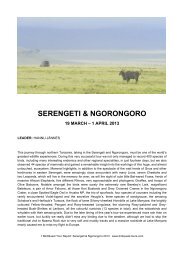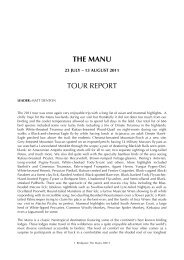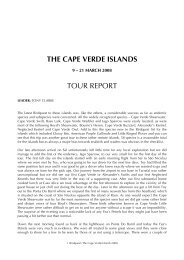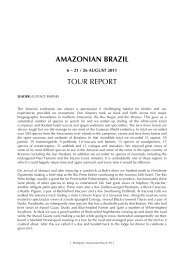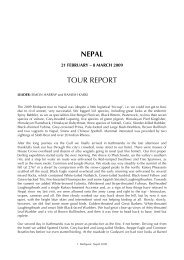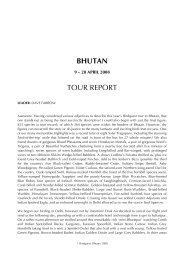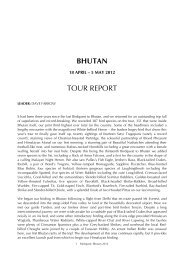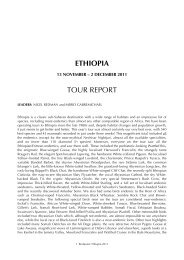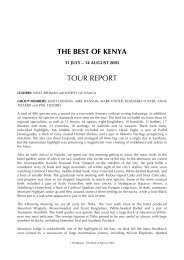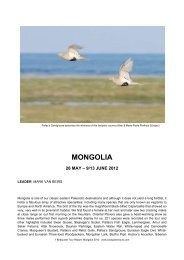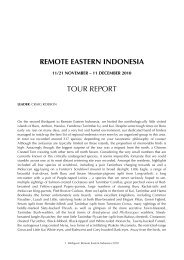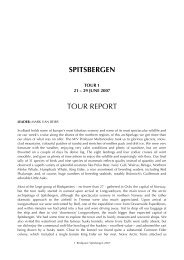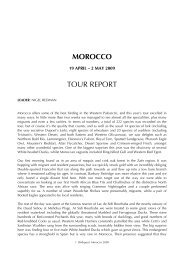INDONESIA (LESSER SUNDAS) REP 10 - Birdquest
INDONESIA (LESSER SUNDAS) REP 10 - Birdquest
INDONESIA (LESSER SUNDAS) REP 10 - Birdquest
Create successful ePaper yourself
Turn your PDF publications into a flip-book with our unique Google optimized e-Paper software.
Black-chested Honeyeater (B-c Myzomela, Red-rumped Honeyeater) Myzomela vulnerata: Regular<br />
observations of this Timor endemic, which is much easier to find than the previous<br />
species, and is particularly common around flowering trees.<br />
NECTARINIIDAE<br />
Brown-throated Sunbird Nectarinia malacensis: Small numbers on Sumba (rubrigena), and Flores<br />
(convergens). Widespread in South-East Asia and the Greater Sundas.<br />
Olive-backed Sunbird Nectarinia jugularis: A few were seen on Bali, Flores and Komodo (ornata).<br />
Another widespread species.<br />
Apricot-breasted Sunbird Nectarinia buettikoferi: This delightful Sumba endemic posed several times<br />
for us along forest edges.<br />
Flame-breasted Sunbird Nectarinia solaris: Many splendid views of this blinding Lesser Sundas<br />
endemic on Timor, Flores and Komodo (nominate race).<br />
DICAEIDAE<br />
Golden-rumped Flowerpecker Dicaeum annae: Common in certain parts of Flores. The golden rumpplumes<br />
were seen for the first time, fluffed out by a displaying bird at Kisol. Endemic to<br />
Sumbawa and Flores.<br />
Thick-billed Flowerpecker Dicaeum agile: Seven of these tail-wagglers were seen on Sumba (tinctum)<br />
and four on Timor (obsoletum).<br />
Black-fronted Flowerpecker Dicaeum igniferum: This Lesser Sundas endemic was regularly observed<br />
on Flores.<br />
Red-chested Flowerpecker Dicaeum maugei: Quite common in the Timor forests (nominate race).<br />
Endemic to the Lesser Sundas and a few islands south of Sulawesi.<br />
Blood-breasted Flowerpecker Dicaeum sanguinolentum: Common on Sumba (wilhelminae), and one<br />
seen at Golo Lusang (rhodopgygiale) by a John and Craig. Restricted to Java, Bali and the<br />
Lesser Sundas.<br />
Scarlet-headed Flowerpecker Dicaeum trochileum: A pair showed well around a Mango tree at<br />
Uluwatu. A very striking Indonesian endemic.<br />
ZOSTEROPIDAE<br />
Oriental White-eye Zosterops palpebrosus: Frequent on Flores, predominantly in the highlands.<br />
Yellow-bellied unicus; surely a potential split.<br />
Mountain White-eye Zosterops montanus: Very common in the Timor and Flores highland forests<br />
(nominate race).<br />
Yellow-spectacled White-eye (Orange-fronted W-e) Zosterops wallacei: Fairly common on Sumba<br />
and Flores. This distinctive orange-fronted ‘dark-eye’ is endemic to the western Lesser<br />
Sundas.<br />
Lemon-bellied White-eye (Moluccan W-e) Zosterops chloris: Quite common around Komodo Eco<br />
Lodge, Labuan Bajo and on Komodo, with several close observations.<br />
Ashy-bellied White-eye Zosterops citrinellus: Common on Sumba and Timor (nominate race).<br />
Yellow-browed Dark-eye (Eye-browed Ibon, White-browed White-eye) Lophozosterops superciliaris:<br />
This ibon was common enough in the highlands of Flores (nominate race), and is endemic<br />
to Sumbawa and Flores.<br />
Crested Dark-eye (Dark-crowned Ibon, Dark-crowned White-eye) Lophozosterops dohertyi: This<br />
handsome ibon was particularly common this year in submontane forests on Flores<br />
(subcristatus), and is endemic to Sumbawa, Satonda and Flores. Much more attractive<br />
than shown in Coates & Bishop.<br />
Spot-breasted Dark-eye (Streak-breasted Ibon, Timor White-eye) Heleia muelleri: It was hard work as<br />
usual with this fast moving mid-storey ibon, but me managed to find at least four on two<br />
days at Camplong and two at Oelnasi. Heleia is one of the few genera that is endemic to<br />
the Lesser Sundas, and the species is considered as Near-Threatened by BirdLife<br />
International.<br />
20 <strong>Birdquest</strong>: The Lesser Sundas 20<strong>10</strong>



